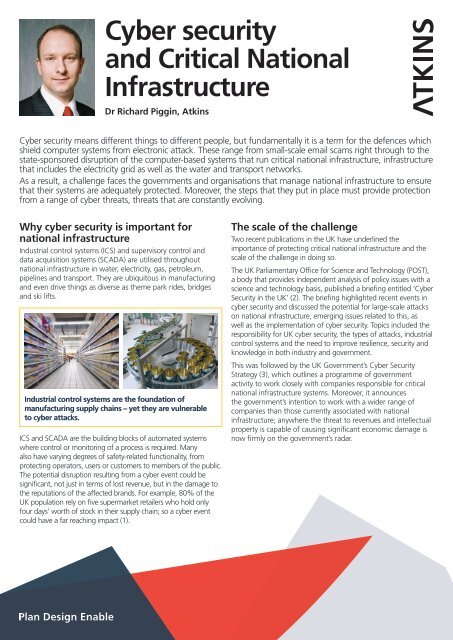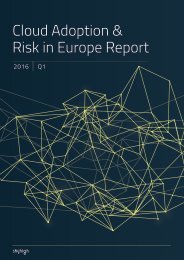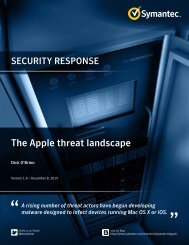Cyber security and critical national infrastructure
Cyber security and critical national infrastructure
Cyber security and critical national infrastructure
You also want an ePaper? Increase the reach of your titles
YUMPU automatically turns print PDFs into web optimized ePapers that Google loves.
<strong>Cyber</strong> <strong>security</strong><strong>and</strong> Critical NationalInfrastructureDr Richard Piggin, Atkins<strong>Cyber</strong> <strong>security</strong> means different things to different people, but fundamentally it is a term for the defences whichshield computer systems from electronic attack. These range from small-scale email scams right through to thestate-sponsored disruption of the computer-based systems that run <strong>critical</strong> <strong>national</strong> <strong>infrastructure</strong>, <strong>infrastructure</strong>that includes the electricity grid as well as the water <strong>and</strong> transport networks.As a result, a challenge faces the governments <strong>and</strong> organisations that manage <strong>national</strong> <strong>infrastructure</strong> to ensurethat their systems are adequately protected. Moreover, the steps that they put in place must provide protectionfrom a range of cyber threats, threats that are constantly evolving.Why cyber <strong>security</strong> is important for<strong>national</strong> <strong>infrastructure</strong>Industrial control systems (ICS) <strong>and</strong> supervisory control <strong>and</strong>data acquisition systems (SCADA) are utilised throughout<strong>national</strong> <strong>infrastructure</strong> in water, electricity, gas, petroleum,pipelines <strong>and</strong> transport. They are ubiquitous in manufacturing<strong>and</strong> even drive things as diverse as theme park rides, bridges<strong>and</strong> ski lifts.Industrial control systems are the foundation ofmanufacturing supply chains – yet they are vulnerableto cyber attacks.ICS <strong>and</strong> SCADA are the building blocks of automated systemswhere control or monitoring of a process is required. Manyalso have varying degrees of safety-related functionality, fromprotecting operators, users or customers to members of the public.The potential disruption resulting from a cyber event could besignificant, not just in terms of lost revenue, but in the damage tothe reputations of the affected br<strong>and</strong>s. For example, 80% of theUK population rely on five supermarket retailers who hold onlyfour days’ worth of stock in their supply chain; so a cyber eventcould have a far reaching impact (1).The scale of the challengeTwo recent publications in the UK have underlined theimportance of protecting <strong>critical</strong> <strong>national</strong> <strong>infrastructure</strong> <strong>and</strong> thescale of the challenge in doing so.The UK Parliamentary Office for Science <strong>and</strong> Technology (POST),a body that provides independent analysis of policy issues with ascience <strong>and</strong> technology basis, published a briefing entitled ‘<strong>Cyber</strong>Security in the UK’ (2). The briefing highlighted recent events incyber <strong>security</strong> <strong>and</strong> discussed the potential for large-scale attackson <strong>national</strong> <strong>infrastructure</strong>, emerging issues related to this, aswell as the implementation of cyber <strong>security</strong>. Topics included theresponsibility for UK cyber <strong>security</strong>, the types of attacks, industrialcontrol systems <strong>and</strong> the need to improve resilience, <strong>security</strong> <strong>and</strong>knowledge in both industry <strong>and</strong> government.This was followed by the UK Government’s <strong>Cyber</strong> SecurityStrategy (3), which outlines a programme of governmentactivity to work closely with companies responsible for <strong>critical</strong><strong>national</strong> <strong>infrastructure</strong> systems. Moreover, it announcesthe government’s intention to work with a wider range ofcompanies than those currently associated with <strong>national</strong><strong>infrastructure</strong>; anywhere the threat to revenues <strong>and</strong> intellectualproperty is capable of causing significant economic damage isnow firmly on the government’s radar.
How is Atkins advancing cyber <strong>security</strong>?Atkins is leading innovations in cyber <strong>security</strong>. An example is the development of new sector – specific st<strong>and</strong>ards for securing ICS <strong>and</strong>SCADA. The goal is to improve the resilience of systems. This can be achieved through education <strong>and</strong> alerting organisations to thenecessity of protecting their systems efficiently – a cost which must be met despite the existence of more tangible business priorities.Since the approaches to ICS <strong>security</strong> differ from information assurance – given the emphasis upon different business goals – the newst<strong>and</strong>ards provide a basis for applying proven methodologies <strong>and</strong> techniques to this specific area. Ongoing work is addressing thegaps in the Information Assurance framework (ISO 27000 series) <strong>and</strong> will provide a scheme for common programme managementthat incorporates the appropriate measures for SCADA <strong>and</strong> industrial control systems.The pace of technological change is relentless.Keeping pace will require people who have adeep underst<strong>and</strong>ing of cyberspace <strong>and</strong> how it isdeveloping.UK <strong>Cyber</strong> Security Strategy, Nov 2011References1. Defra Groceries Report 2006http://archive.defra.gov.uk/evidence/economics/foodfarm/reports/documents/Groceries%20paper%20May%202006.pdf2. POSTnote 389, September 20113. UK <strong>Cyber</strong> Security Strategy, Cabinet Office, November 2011Dr Richard Piggin is a Security Sector Manager at Atkins. He has anEngineering Doctorate in Industrial Control Systems Communicationsfrom the University of Warwick <strong>and</strong> has previously worked for severalcontrol system vendors in network, <strong>security</strong> <strong>and</strong> safety-related roles. Heis a UK expert to several IEC <strong>Cyber</strong> Security Working Groups involvedin producing IEC 62443 covering Industrial Automation <strong>and</strong> ControlSystems Security. At Atkins, Richard specialises in working with clients tomake their systems resilient against current <strong>and</strong> emerging threats.richard.piggin@atkinsglobal.comwww.atkinsglobal.com/<strong>security</strong>





